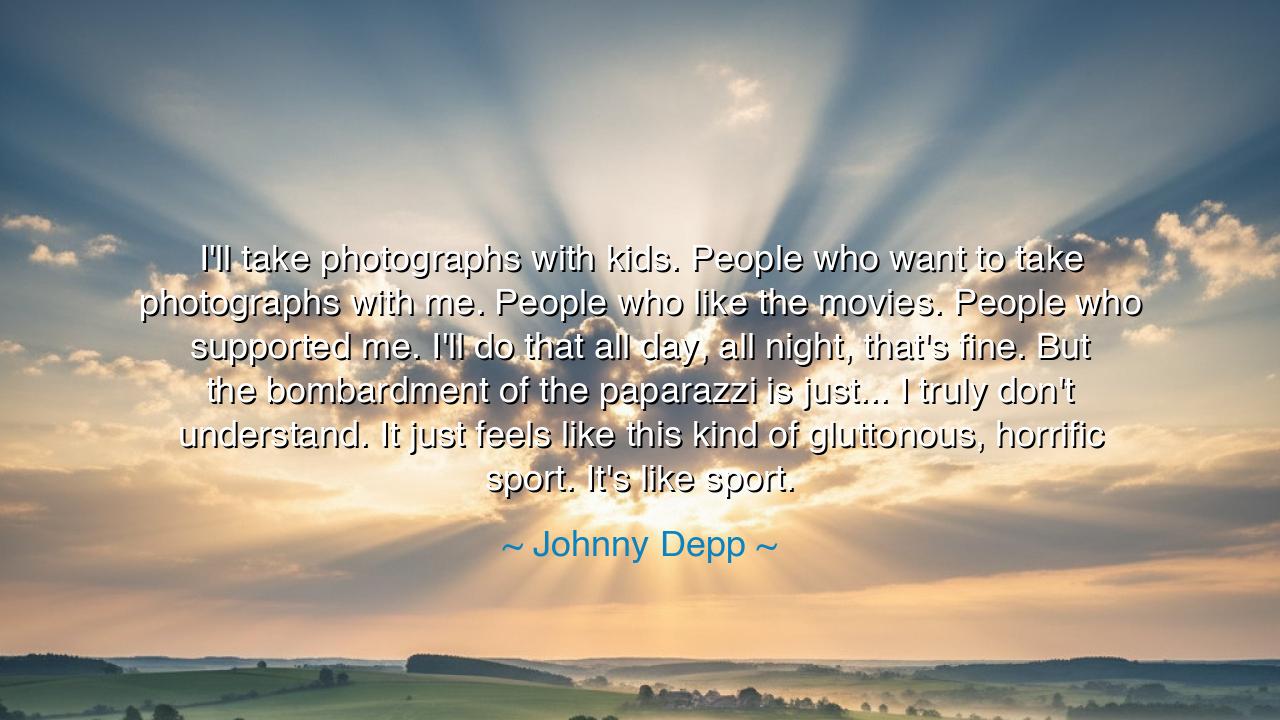
I'll take photographs with kids. People who want to take
I'll take photographs with kids. People who want to take photographs with me. People who like the movies. People who supported me. I'll do that all day, all night, that's fine. But the bombardment of the paparazzi is just... I truly don't understand. It just feels like this kind of gluttonous, horrific sport. It's like sport.






"I'll take photographs with kids. People who want to take photographs with me. People who like the movies. People who supported me. I'll do that all day, all night, that's fine. But the bombardment of the paparazzi is just... I truly don't understand. It just feels like this kind of gluttonous, horrific sport. It's like sport." These words spoken by Johnny Depp offer a deeply emotional reflection on the toll that fame takes on the individual. At once an admission of his willingness to engage with the fans who have supported him and a plea for understanding, Depp’s statement paints a vivid picture of the dual nature of celebrity life. It speaks of the love for fans and the disdain for the invasive, relentless paparazzi, a group whose pursuit of profit seems to disregard the humanity of the person they chase. Depp, a figure often surrounded by fame, fame that he neither sought nor invited, draws the line between true connection and exploitation.
At the heart of Depp’s words is the contrast between authentic engagement and sensationalist exploitation. The idea of taking photographs with children or fans who genuinely admire him speaks to the humanity of his celebrity. In these moments, he is not a commodity but a person, sharing in the joy of connection and appreciation. However, the moment the paparazzi enter the scene, something changes. It is not about admiration anymore; it is about profit and the violence of voyeurism. To be chased, bombarded, and exposed for the sake of selling a photograph feels to Depp like a gluttonous sport, devoid of respect and decency. The paparazzi, in their relentless pursuit, are not seeking to understand the man but to exploit him as an object for their entertainment.
This sense of exploitation has been a part of the celebrity culture for as long as there has been fame. The gluttony Depp describes is not new. Consider the case of Princess Diana, whose life was a constant barrage of cameras, flashing in her face even during her most private moments. Diana’s tragic end at the hands of the paparazzi serves as a stark reminder of the consequences of unrestrained pursuit. In the quest for profit, her humanity was overshadowed by a media industry that cared more for headlines than the well-being of the person behind them. Just like Depp’s own lament, Diana's tragic story underscores the dangers of a society where fame and personal identity are bought and sold as spectacles.
The line that Depp draws between those who genuinely support him and the paparazzi who treat his life as a sport reflects a timeless struggle between authenticity and exploitation. The gluttonous pursuit of celebrities by the press is an ancient form of consumption—not of food or resources, but of human dignity. The more the public consumes these images, the more the paparazzi provide. It is a feedback loop of dehumanization, where the value of the person becomes tied not to their inner worth but to the profit made off their likeness. The paparazzi, like hunters seeking prey, are only concerned with capturing the most sensational, the most invasive shot, all in the name of capitalism.
What is to be done? The lesson in Depp’s words is clear: the pursuit of fame should not come at the cost of humanity. As individuals, we must recognize the line between connection and exploitation. True connection is rooted in respect and mutual understanding, while exploitation seeks to profit from the suffering or invasion of others. Respect is the foundation of meaningful relationships, whether between a fan and an artist or between two individuals in the quiet of their daily lives. The fans Depp speaks of are those who value him not as a product but as a person—someone they respect, someone whose work they enjoy and admire.
In practical terms, we can all adopt this lesson into our own lives. Whether we are in the public eye or simply living our lives in our communities, we must strive to see the humanity in those around us. It is easy to fall into the trap of reducing people to their roles, to their jobs, or to their appearances. However, each individual is more than the sum of their public image. By fostering respect and seeking authentic connections with others, we can contribute to a world where consumption does not come at the expense of human dignity.
Lastly, let us turn our gaze inward. Fame and attention, in all its forms, can be an intoxicating force. Yet, we must ask ourselves: What are we truly seeking when we look at others through the lens of paparazzi? Are we seeing them as whole beings, worthy of respect, or are we only interested in their image? Let us commit to respecting the humanity in others, to engaging with others in a way that is not exploitative, but supportive. In doing so, we will begin to heal the divisions between celebrity and humanity, embracing the truth that every person, regardless of fame, deserves to be seen and treated with the dignity they deserve.






AAdministratorAdministrator
Welcome, honored guests. Please leave a comment, we will respond soon